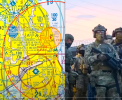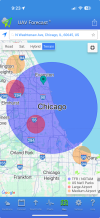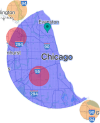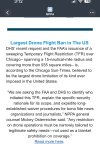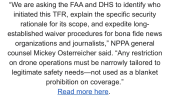You are using an out of date browser. It may not display this or other websites correctly.
You should upgrade or use an alternative browser.
You should upgrade or use an alternative browser.
"Credible Threat" Prompts Drone Ban in Chicago.
- Thread starter The Droning Company
- Start date
AMann
Well-Known Member
Portland, OR has had a new one also. Probably will be more soon…
This is the way it starts out, TFRs in the big city and slowly get bigger until they engulf the suburbs. Then next are the rural areas until the smaller states are covered entirely. TFR go for days and weeks and eventually months and years until they become permanent or indefinite. You can do it in DC, you can do it anywhere. Before you know it, drone flights is heavily restricted nationwide unless you get permission from the government.
AMann
Well-Known Member
And I’d like to take a guess about what buildings are dead center of the Portland and Chicago TFRs. Any others? Looking at LA now also…
The free press is finally taking the necessary steps to defend their Constitutional rights.
Mickey H. Osterreicher, NPPA general counsel, issued a scathing statement October 5 calling out the sweeping Temporary Flight Restriction over Chicago.
“This unprecedented flight restriction prevents journalists from using drones to document matters of clear public concern,” Osterreicher said. “When the government imposes such a broad and prolonged ban on newsgathering, it risks turning ‘security’ into a pretext for suppressing press freedom.”
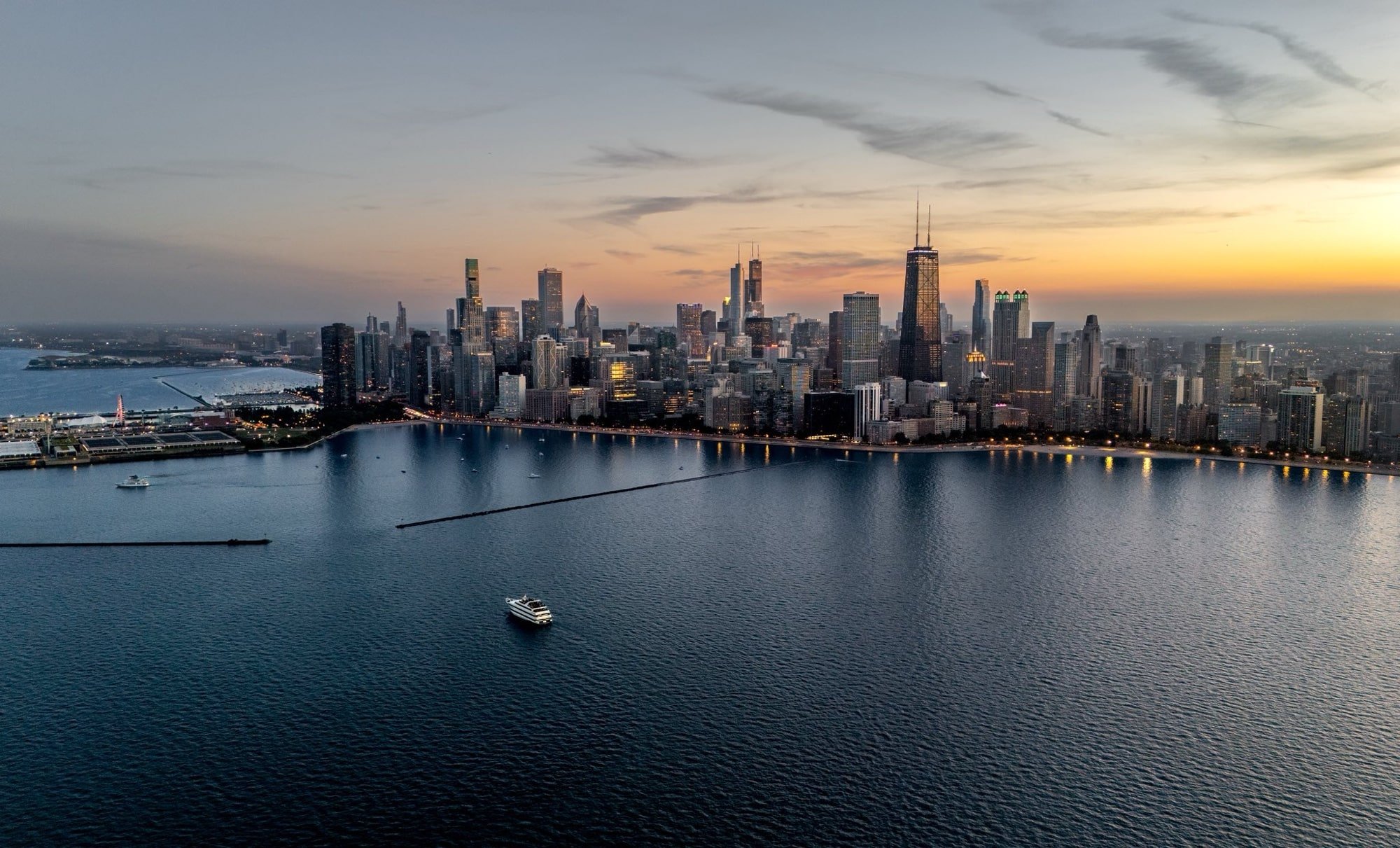
 dronexl.co
dronexl.co
Mickey H. Osterreicher, NPPA general counsel, issued a scathing statement October 5 calling out the sweeping Temporary Flight Restriction over Chicago.
“This unprecedented flight restriction prevents journalists from using drones to document matters of clear public concern,” Osterreicher said. “When the government imposes such a broad and prolonged ban on newsgathering, it risks turning ‘security’ into a pretext for suppressing press freedom.”

Journalism Group Slams ‘Largest Drone Ban Ever’ As Attack On Press Freedom
The National Press Photographers Association has condemned the largest drone flight restriction ever imposed in the United States as an unconstitutional
 dronexl.co
dronexl.co
Well of course! Like 99.5% of people, they didn't give a crap until it began to impact them.The free press is finally taking the necessary steps to defend their Constitutional rights.
Mickey H. Osterreicher, NPPA general counsel, issued a scathing statement October 5 calling out the sweeping Temporary Flight Restriction over Chicago.
“This unprecedented flight restriction prevents journalists from using drones to document matters of clear public concern,” Osterreicher said. “When the government imposes such a broad and prolonged ban on newsgathering, it risks turning ‘security’ into a pretext for suppressing press freedom.”

Journalism Group Slams ‘Largest Drone Ban Ever’ As Attack On Press Freedom
The National Press Photographers Association has condemned the largest drone flight restriction ever imposed in the United States as an unconstitutionaldronexl.co
How did they get their news information before they had drones?The free press is finally taking the necessary steps to defend their Constitutional rights.
Mickey H. Osterreicher, NPPA general counsel, issued a scathing statement October 5 calling out the sweeping Temporary Flight Restriction over Chicago.
“This unprecedented flight restriction prevents journalists from using drones to document matters of clear public concern,” Osterreicher said. “When the government imposes such a broad and prolonged ban on newsgathering, it risks turning ‘security’ into a pretext for suppressing press freedom.”

Journalism Group Slams ‘Largest Drone Ban Ever’ As Attack On Press Freedom
The National Press Photographers Association has condemned the largest drone flight restriction ever imposed in the United States as an unconstitutionaldronexl.co
That's not how rights work,How did they get their news information before they had drones?
“condemned the largest drone flight restriction ever imposed in the United States as an unconstitutional attack on aerial journalism”.That's not how rights work,
There was no “aerial journalism” when the Constitution was written, nor until truly a few decades ago. So there is no such thing as a constitutional “right” to such a thing. So, my question is valid - they had to produce their info and content in other ways.
That's not a valid question and that's not how the Constitution works. I'm a little shocked you live in AL and think that way. But I guess.....“condemned the largest drone flight restriction ever imposed in the United States as an unconstitutional attack on aerial journalism”.
There was no “aerial journalism” when the Constitution was written, nor until truly a few decades ago. So there is no such thing as a constitutional “right” to such a thing. So, my question is valid - they had to produce their info and content in other ways.
Anytime someone says "...when the Constitution was written...." I'm afraid all is lost.
It certainly is a valid question, especially if you’re an originalist interpreter of the constitution - which for most US history is how it has been interpreted. It is the only way to keep from going down slippery slopes of reinterpreting what the writers meant when defining our beliefs and government. It’s never “when the constitution was written” but “what did the writers mean when they wrote it.” If you don’t have that, then you can interpret it to say anything you want - which people do today.That's not a valid question and that's not how the Constitution works. I'm a little shocked you live in AL and think that way. But I guess.....
Anytime someone says "...when the Constitution was written...." I'm afraid all is lost.
Freedom of the press is guaranteed, but the methods of how they gain their information is not and is certainly not a constitutionally-defined area.

Originalism vs. Living Constitutionalism: How Different Philosophies Shape Constitutional Law
The U.S. Constitution guides American government and society, but interpreting a document written in the 18th century for modern challenges sparks intense debate. Two primary philosophies—originalism and living constitutionalism—offer fundamentally different approaches to constitutional...
Bullpucky and horse feathers! Freedoms are not diminished by the advent of technology, they are enhanced. Freedom of speech in the Constitution includes freedom of said speech in radio, television and the internet (despite what his majesty may think). Same thing for Freedom of the Press. Even though computers hadn't been around during the development of the Constitution, Freedom of the Press still applies. Anti gunners try to use your argument to take away arms, despite the Constitution being very specific that ability to bear arms is a right that shall not be infringed upon. Despite popular belief, firearms capable of multiple fire as well as canons capable of firing grape shot and thus capable of killing or maiming several yet neither were singled out for exclusion by the second amendment.“condemned the largest drone flight restriction ever imposed in the United States as an unconstitutional attack on aerial journalism”.
There was no “aerial journalism” when the Constitution was written, nor until truly a few decades ago. So there is no such thing as a constitutional “right” to such a thing. So, my question is valid - they had to produce their info and content in other ways.
Claiming something wasn't around when the Constitution was written and therefore isn't covered is a loser's argument, has no measure or meaning and should be ignored.
Last edited:
You said a lot of things, but nothing that actually refutes this statement: "Freedom of the press is guaranteed, but the methods of how they gain their information is not and is certainly not a constitutionally-defined area."Bullpucky and horse feathers! Freedoms are not diminished by the advent of technology, they are enhanced. Freedom of speech in the Constitution includes freedom of said speech in radio, television and the internet (despite what his majesty may think). Same thing for Freedom of the Press. Even though computers hadn't been around during the development of the Constitution, Freedom of the Press still applies. Anti gunners try to use your argument to take away arms, despite the Constitution being very specific that ability to bear arms is a right that shall not be infringed upon. Despite popular belief, firearms capable of multiple fire as well as canons capable of firing grape shot and thus capable of killing or maiming several yet neither were singled out for exclusion by the second amendment.
Claiming something wasn't around when the Constitution was written and therefore isn't covered is a loser's argument, has no measure or meaning and should be ignored.
I am not arguing that journalists shouldn't be allowed to use drones to capture footage (as long as safety isn't a concern, as I think most on here would agree), but making the point that using them is a right guaranteed in the Constitution is simply not true. No method of gathering info, or disseminating info, is defined in the Constitution in support of "freedom of the press" - just no Congressional law prohibiting it or abridging it can exist. It would be a difficult legal battle to argue that limiting their ability to fly drones would be prohibiting their 1st Amendment rights.
You are correct in what you say about guns/anti-gun people, and I fully agree. But "guns" (called "arms" in the 2nd Amendment) are clearly named - and as you say, are in no way defined, thus are not limited to what that means. So it would encompass any kind of gun...something anti-2nd amendment people refute all the time. The 1st amendment does not do the same thing regarding methods of gathering or disseminating info in support of "freedom of the press." By conflating the logic of the 2nd amendment to the 1st amendment, the press can use any elicit or illegal means to get information, and they can also release top secret highly dangerous information (illegally) with no threat of reprisal. Neither of those should be true. Freedom of the press was never meant to be a carte blanche statement.

Freedom of Press Overview
"Several Court holdings do firmly point to the conclusion that the press clause does not confer on the press the power to compel government to furnish information or otherwise give the press access to information that the public generally does not have.3 Nor, in many respects, is the press entitled to treatment different in kind from the treatment to which any other member of the public may be subjected.4 “Generally applicable laws do not offend the First Amendment simply because their enforcement against the press has incidental effects.” "
As a recent transplant to Portland Oregon, having only lived here a short 50 years, I'm having a really hard time believing the media reports these days.
I think we need MORE eyes in the sky from the general population than less.
These TFR's seem a little more like control rather than safety.
I think we need MORE eyes in the sky from the general population than less.
These TFR's seem a little more like control rather than safety.
Chip
Well-Known Member
- Joined
- Sep 11, 2017
- Messages
- 2,213
- Reactions
- 2,737
Yes, the FAA imposes a TFR which bans the news media from news gathering by drone but does not ban "special" government drones flying with special authorization. I used to think the FAA would not impose a TFR banning news media or anyone else from flying unless they had legitimate safety reason which could be articulated and explained. But when asked why they imposed TFRs all over New Jersey in DEC/JAN 24-25 if they knew there was no real danger or genuine concern, the FAA said because a "security partner" asked us to. This is not a new issue. The ACLU got involved with it when a TFR banned drones over the Dakota pipeline protest a few years ago. It also came up at the time of the Ferguson MO protests. An audio clip circulated of a recorded phone conversation where the reason for requesting/issuing the TFR was basically to control news coverage.As a recent transplant to Portland Oregon, having only lived here a short 50 years, I'm having a really hard time believing the media reports these days.
I think we need MORE eyes in the sky from the general population than less.
These TFR's seem a little more like control rather than safety.
Last edited:
And there you have the 2nd most common form of mis-interpretation of the Constitution: the "you can't yell fire in a movie theater" ridiculousness.You said a lot of things, but nothing that actually refutes this statement: "Freedom of the press is guaranteed, but the methods of how they gain their information is not and is certainly not a constitutionally-defined area."
I am not arguing that journalists shouldn't be allowed to use drones to capture footage (as long as safety isn't a concern, as I think most on here would agree), but making the point that using them is a right guaranteed in the Constitution is simply not true. No method of gathering info, or disseminating info, is defined in the Constitution in support of "freedom of the press" - just no Congressional law prohibiting it or abridging it can exist. It would be a difficult legal battle to argue that limiting their ability to fly drones would be prohibiting their 1st Amendment rights.
You are correct in what you say about guns/anti-gun people, and I fully agree. But "guns" (called "arms" in the 2nd Amendment) are clearly named - and as you say, are in no way defined, thus are not limited to what that means. So it would encompass any kind of gun...something anti-2nd amendment people refute all the time. The 1st amendment does not do the same thing regarding methods of gathering or disseminating info in support of "freedom of the press." By conflating the logic of the 2nd amendment to the 1st amendment, the press can use any elicit or illegal means to get information, and they can also release top secret highly dangerous information (illegally) with no threat of reprisal. Neither of those should be true. Freedom of the press was never meant to be a carte blanche statement.

Freedom of Press Overview
www.law.cornell.edu
"Several Court holdings do firmly point to the conclusion that the press clause does not confer on the press the power to compel government to furnish information or otherwise give the press access to information that the public generally does not have.3 Nor, in many respects, is the press entitled to treatment different in kind from the treatment to which any other member of the public may be subjected.4 “Generally applicable laws do not offend the First Amendment simply because their enforcement against the press has incidental effects.” "
"Your rights are not absolute so therefore it's ok if I take some of them!"
Why do we have to go over this for every time something new comes up? The Internet is not covered. Drones are not covered. Laser guns are not covered.
The same way the government can't put up yellow crime tape in a ring around the city of Chicago and tell reporters to stay outside the tape is the same way they can't launch a TFR the size of Illinois to keep drones from seeing what ICE does on roof tops in downtown Chicago.
The police tried to say filming them either with cameras or recording equipment (video or film) was illegal and even arrested some people. The SCOTUS said "Bullpucky and Horse feathers" (legal terminology) and said the police were wrong, it was the people's right to record so long as they were not interfering with the police doing their job. Unless the FAA rules a zone unsafe for drones, local and even other branches of the Federal government should be told to go pound sand. And even in cases where the FAA states such a fact, they should have proof that the act is within their own rules and not because someone tells them to do so, though I would not be surprised to see them do so.You said a lot of things, but nothing that actually refutes this statement: "Freedom of the press is guaranteed, but the methods of how they gain their information is not and is certainly not a constitutionally-defined area."
I am not arguing that journalists shouldn't be allowed to use drones to capture footage (as long as safety isn't a concern, as I think most on here would agree), but making the point that using them is a right guaranteed in the Constitution is simply not true. No method of gathering info, or disseminating info, is defined in the Constitution in support of "freedom of the press" - just no Congressional law prohibiting it or abridging it can exist. It would be a difficult legal battle to argue that limiting their ability to fly drones would be prohibiting their 1st Amendment rights.
You are correct in what you say about guns/anti-gun people, and I fully agree. But "guns" (called "arms" in the 2nd Amendment) are clearly named - and as you say, are in no way defined, thus are not limited to what that means. So it would encompass any kind of gun...something anti-2nd amendment people refute all the time. The 1st amendment does not do the same thing regarding methods of gathering or disseminating info in support of "freedom of the press." By conflating the logic of the 2nd amendment to the 1st amendment, the press can use any elicit or illegal means to get information, and they can also release top secret highly dangerous information (illegally) with no threat of reprisal. Neither of those should be true. Freedom of the press was never meant to be a carte blanche statement.

Freedom of Press Overview
www.law.cornell.edu
"Several Court holdings do firmly point to the conclusion that the press clause does not confer on the press the power to compel government to furnish information or otherwise give the press access to information that the public generally does not have.3 Nor, in many respects, is the press entitled to treatment different in kind from the treatment to which any other member of the public may be subjected.4 “Generally applicable laws do not offend the First Amendment simply because their enforcement against the press has incidental effects.” "
jephoto
Well-Known Member
jephoto
Well-Known Member
Chip
Well-Known Member
- Joined
- Sep 11, 2017
- Messages
- 2,213
- Reactions
- 2,737
Similar threads
- Replies
- 1
- Views
- 345
- Replies
- 6
- Views
- 667
- Replies
- 9
- Views
- 705
- Locked
- Replies
- 2
- Views
- 593
- Replies
- 15
- Views
- 1K
DJI Drone Deals
New Threads
-
-
-
How To Find The Best Spots and Places To Fly Your Drone?
- Started by jaystechvault
- Replies: 1
-
How to Know Where You Can *Actually* Fly a Drone (Easily find ground rules)
- Started by jaystechvault
- Replies: 0
-
Members online
Total: 4,907 (members: 7, guests: 4,900)



